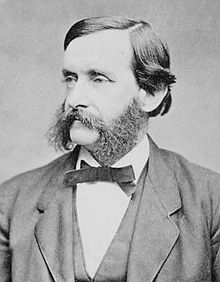
Back توماس وينتورث هيغينسون Arabic توماس وينتورث هيجينسون ARZ تۆماس وێنتوۆرس ھیگینسۆن CKB Thomas Wentworth Higginson German Thomas Wentworth Higginson Spanish Thomas Wentworth Higginson French Thomas Wentworth Higginson Italian トーマス・ウェントワース・ヒギンソン Japanese تاماس وينټورت هيګنسن PS Thomas Wentworth Higginson Romanian
Thomas Wentworth Higginson | |
|---|---|
 | |
| Member of the Massachusetts House of Representatives from the 1st Middlesex district | |
| In office January 7, 1880 – January 4, 1882 Serving with George W. Park (1880) and Henry W. Muzzey (1881) | |
| Preceded by | Edwin B. Hale |
| Succeeded by | Chester W. Kingsley |
| Personal details | |
| Born | December 22, 1823 Cambridge, Massachusetts, U.S. |
| Died | May 9, 1911 (aged 87) Cambridge, Massachusetts, U.S. |
| Political party | Free Soil (1850–51) Republican Democratic (1888) |
| Occupation | Minister, author, soldier |
| Signature | |
Thomas Wentworth Higginson (December 22, 1823 – May 9, 1911), who went by the name Wentworth,[1]: 52 was an American Unitarian minister, author, abolitionist, politician, and soldier. He was active in abolitionism in the United States during the 1840s and 1850s, identifying himself with disunion and militant abolitionism. He was a member of the Secret Six who supported John Brown. During the Civil War, he served as colonel of the 1st South Carolina Volunteers, the first federally authorized black regiment, from 1862 to 1864.[2] Following the war, he wrote about his experiences with African-American soldiers and devoted much of the rest of his life to fighting for the rights of freed people, women, and other disfranchised peoples. He is also remembered as a mentor to poet Emily Dickinson.
- ^ Renehan, Edward J. Jr. (1995). The Secret Six. The True Tale of the Men Who Conspired with John Brown. New York: Crown. ISBN 051759028X.
- ^ Ash, Stephen V., Firebrand of Liberty: The Story of Two Black Regiments that Changed the Course of the Civil War. New York: W. W. Norton & Company, 2008.